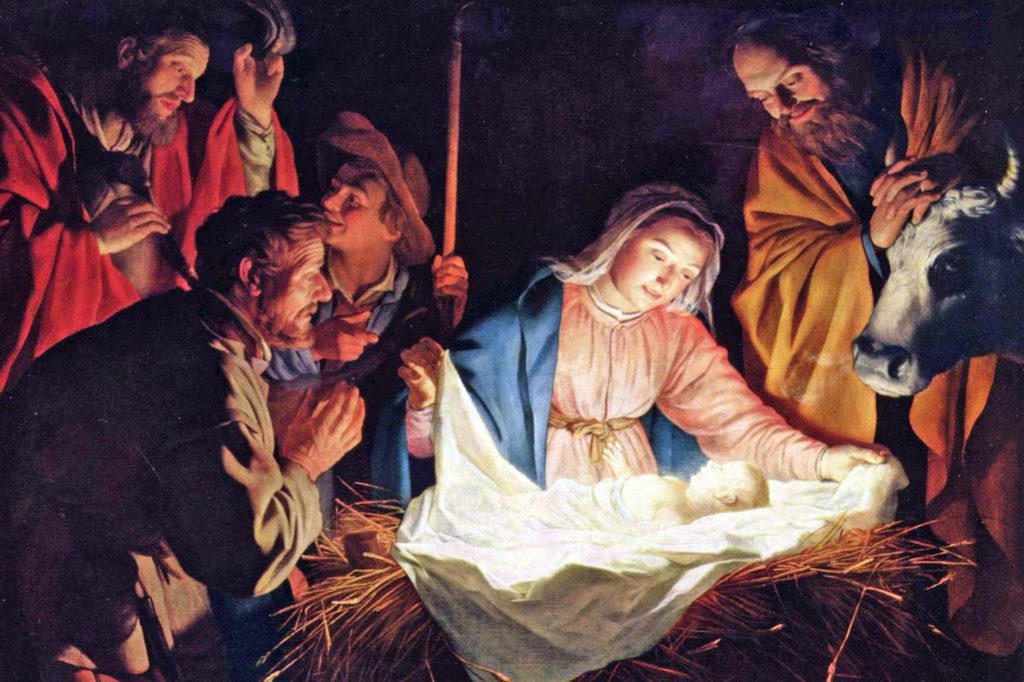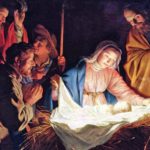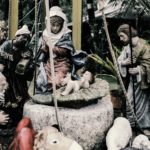Scandal. Treason. Mass infanticide. Narrow escape. These are the elements of dark drama. When we celebrate the advent of our Lord, we tend to avoid thinking of such horrors. But they are inextricably part of the Christmas story. They are not minor details that can be brushed aside.
Yet we often neglect these elements of the Christmas story. Our familiarity with the story causes these bleak details to slip between the cracks. They can be distressing and seem to spoil the joy and wonder of Christ’s coming.
But we may discover hope and blessing by contemplating the Christmas story in its entirety. Only when we understand the darkness that overshadows the advent of Christ can we be fully comforted by the light of Christ’s coming.
The Incarnation’s Tremors
Start your day with Public Discourse
Sign up and get our daily essays sent straight to your inbox.The narrative of the Incarnation defies our culture’s all too frequent tendency, even among Christians, to water down Christmas into a merely sweet, happy story. While the season of Advent is one of great hope and joy, Christ’s coming was marked by sorrow, uncertainty, unbelief, and brutality.
We tend to forget that Joseph planned to divorce Mary for adultery, a grave sin with equally grave consequences (stoning) in those days. Imagine Mary’s own distress—despite her unparalleled joy—in knowing the effect of her surprise pregnancy on her relationship with Joseph. She surely knew that the divorce by Joseph would leave her with a life of shame and destitution, even if she escaped worse judgment.
Consider Joseph’s traumatic experience of discovering what he thought was the betrayal of his future wife. Yet this pain did not cloud Joseph’s faith. When an angel appeared to Joseph in a dream, he believed the angel’s words and heeded his command, though it came at considerable personal cost. Joseph had faith enough to believe an incredible revelation: that the power of the Holy Spirit had come upon Mary and conceived in her the promised Messiah.
Lest we think that the tidings of angels will always kindle darkened hearts, we should recall Zacharias. He doubted the angel who told him that his wife would bear a child in her old years. He should have remembered how God had brought the son of the promise, Isaac, to Abraham and Sarah when they were well beyond childbearing years. But Zacharias lacked faith. His doubting heart required divine intervention.
Forgotten Infanticide
We often overlook the most tragic part of the Christmas story: that when Jesus was still an infant, Joseph fled with his family to a foreign country to escape the mass infanticide perpetrated by King Herod and his soldiers. Jesus and His family escaped to Egypt, unwittingly reenacting the exile of Israel to that same land centuries before. Still, the slaughter ensued in Bethlehem. Hundreds of mothers and fathers raised their voices in agony as the darkness of Herod attempted to stamp out the light of the Incarnation. So was Jeremiah’s prophecy fulfilled:
A voice was heard in Ramah,
Lamentation and bitter weeping,
Rachel weeping for her children,
Refusing to be comforted for her children,
Because they are no more.
(Jer. 31:15)
Christ’s advent happened in and through suffering and darkness. Jesus did not come in power and majesty but in apparent weakness and ignominy. This is the paradigm of the whole history of redemption. Paul writes, “But God chose what is foolish in the world to shame the wise; God chose what is weak in the world to shame the strong; God chose what is low and despised in the world, even things that are not, to bring to nothing things that are” (1 Cor. 1:27-28). It turns out that the pattern for Christian living that Paul preaches to the church is embodied in the Incarnation.
Born into Desolation
The entire story of the Incarnation is astonishing. An innkeeper left a poor, pregnant Jewish girl to give birth in a cold cave after she had journeyed with her husband from the other end of the country so that they could pay taxes to a pagan emperor. Mary thus gave birth to the King of kings amid squalor, poverty, and oppression. Christ’s first visitors were social outcasts and religious outsiders—mere common shepherds. From the moment he was born, Jesus came in powerful weakness for the downtrodden, the marginalized, and the helpless.
As far as we know, the first dignitaries to pay homage to Him were Gentiles, signifying that Israel would reject its own Messiah but that the nations of the earth would come to honor Him. As John wrote, “He was in the world, and the world was made through Him, and the world did not know Him. He came to His own, and His own did not receive Him” (John 1:10-11).
The unfolding of the Christmas story revealed the purposes of God and the nature of Christ’s kingship long before Jesus began his public ministry. The Father could have chosen for Jesus to be born into royal splendor, power, and universal fame. But He didn’t. Instead, God displayed His glory and mighty power by working though seemingly weak and foolish means to reach into the dark depths of our human condition so that He could redeem a lost people and recreate a broken world.
Perhaps no one understood this better than Mary. In her Magnificat, Mary praises the power of God manifest in the coming of the promised Messiah:
He has shown strength with his arm;
he has scattered the proud in the thoughts of their hearts;
he has brought down the mighty from their thrones
and exalted those of humble estate;
he has filled the hungry with good things,
and the rich he has sent away empty.
Piercing Light
The light of the world came to give the light of life (John 8:12) to those in darkness. Isaiah prophesied this redemptive illumination:
The people who walked in darkness
Have seen a great light;
Those who dwelt in the land of the shadow of death
Upon them a light has shined.
(9:2)
Christ’s light pierces the darkness of our sin, pain, and suffering. God gives us a Messiah who comes to us directly though suffering, darkness, and doubt. The devastation of humanity is no match for his strength, for he is the Mighty God (Isaiah 9:6). In chapter 14 of Miracles, C.S. Lewis paints a vivid picture of the Incarnate Power: “In the Christian story God descends to re-ascend. . . . He goes down to come up again and bring the whole ruined world up with Him. . . . He must stoop in order to lift, he must almost disappear under the load before he incredibly straightens his back and marches off with the whole mass swaying on his shoulders.”
The God-Man stands poised to stoop down into our pain and darkness and lift us out of it. He will redeem our souls and heal our broken hearts. Our weak earthen vessels He will raise in power (1 Cor. 15:43). Indeed, God has already “raised us up with him and seated us with him in the heavenly places in Christ Jesus” (Eph. 2:6).
So let us cast ourselves upon Him who will carry us on his shoulders as a father with His young children. His promise is sure:
But to you who fear My name
The Sun of Righteousness shall rise
With healing in His wings.
(Mal. 4:2)
Or, in the words of Charles Wesley:
Hail the heaven-born Prince of Peace!
Hail the Sun of Righteousness!
Light and life to all He brings,
Ris’n with healing in His wings.Mild he lays his Glory by,
Born—that Man no more may die,
Born—to raise the Sons of Earth,
Born—to give them Second Birth.
The story of Advent can fill us with true hope precisely because it unfolds amid the darkness that afflicts us. Christ’s radiance shines most beautifully in the shadows. So let us not turn aside from this vision. We come to adore the Light of the World who descended into our night. He is the Dayspring from on high who has come to His people. He is Emmanuel — God with us.














